Which 'smart' assistant is actually smarter—Amazon's Alexa or Google Assistant?
Does one really know more than the other?
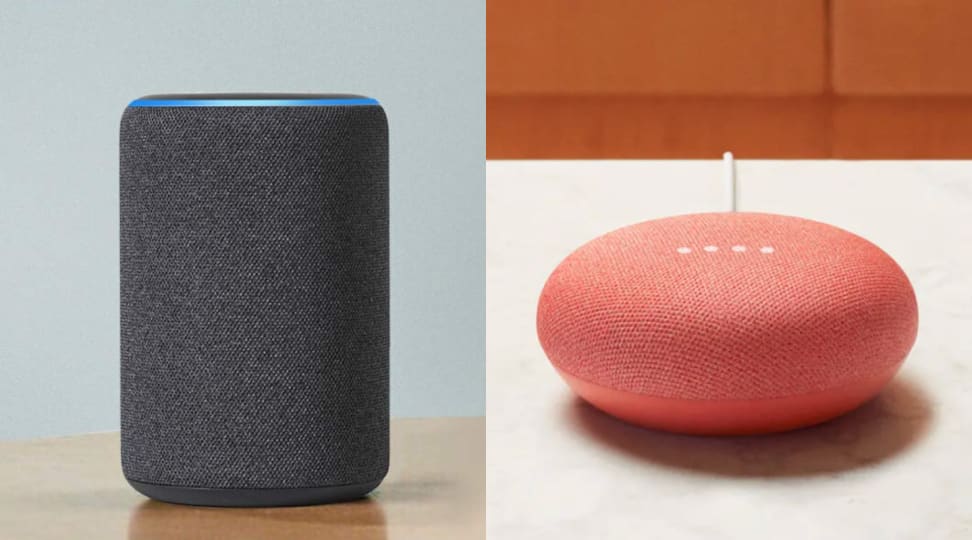 Credit:
Amazon / Google
Credit:
Amazon / Google
Products are chosen independently by our editors. Purchases made through our links may earn us a commission.
These days, just about every smart home gadget works with Google Assistant or Amazon’s Alexa. And, for the most part, Google Assistant and Alexa can do many of the same things—like give you the weather forecast, play music, read the news, and so much more.
But, when you compare Alexa and Google Assistant head to head, which intelligent personal assistant is smarter? We took a deep dive into the nitty-gritty of both Alexa and Google Assistant to find out which smart assistant knows—and can do—more.
Alexa Skills vs. Google Assistant Actions
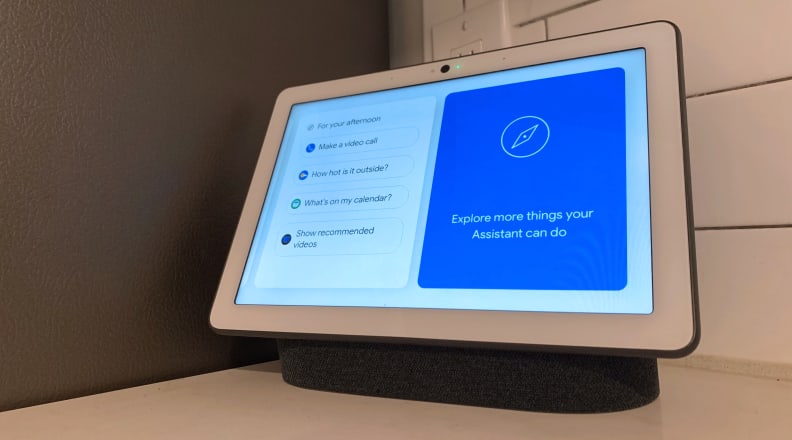
The Hub Max comes with Google Assistant, so you can check the weather, watch recipe videos, control your smart home, and more.
Actions and skills are basically apps for your smart speaker. You launch and interact with them using specific voice commands. Some of them are built into the smart speaker already, and some you have to install with the Alexa or Google Assistant app on your phone. Google refers to its apps as “actions,” while Alexa calls them “skills.”
When it comes to the number of things your smart speaker can actually do, Google Assistant has Alexa beat by a mile. Google Assistant touts more than one million actions to choose from. And, Google Assistant can handle up to three commands at once like, "Hey Google, turn off the bedroom lamp, set the thermostat to 75, and set the volume to 3."
While Alexa can only handle one command at a time, she can still do plenty, offering more than 100,000 skills like tracking all of your Amazon Prime orders, which Google Assistant can't do. Even so, it’s nowhere near the number of actions that Google Home has.
Winner: Google Assistant
Alexa vs. Google Assistant: Smart home integration
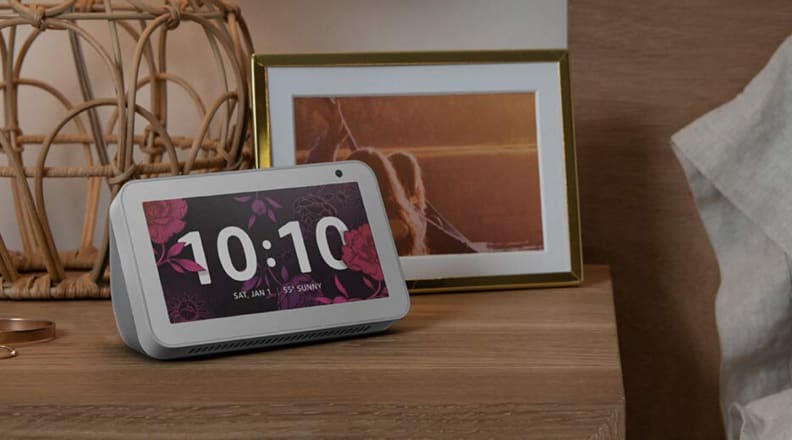
The Echo Show 5 is one of Amazon's Alexa-enabled smart display screens.
Controlling your smart home with Alexa or Google Assistant is easier than you might think since many smart home gadgets work with one or both smart assistants. However, as of September 2019, Alexa works with more smart home devices than Google Home—85,000 to be exact.
That’s quite a bit more than Google Assistant, which “works with more than 30,000 devices from over 3,500 home automation brands.”
Winner: Alexa
Alexa vs. Google Assistant: Ease of use
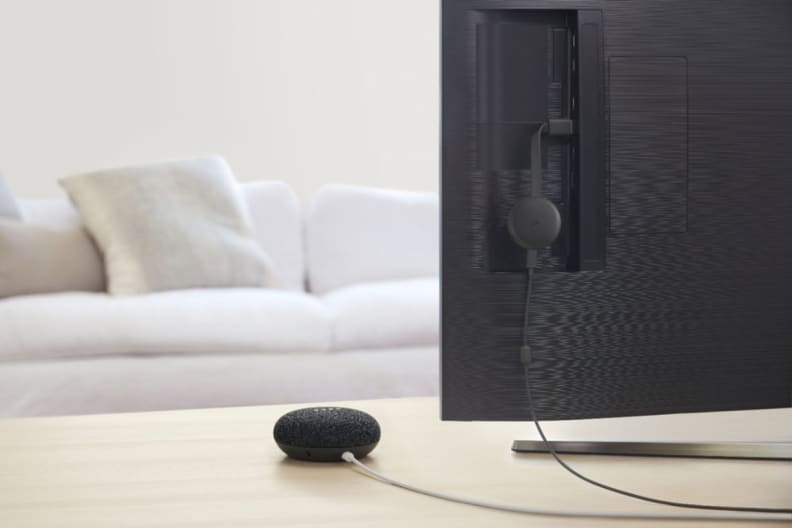
The Nest Mini includes a power adapter so you can plug it into an electrical outlet.
From misunderstandings to repeating commands, talking to your smart assistant can sometimes feel like an uphill battle. (And, if you’re new to the world of smart home, getting the dialogue down pat with Google or Alexa can feel like learning a new language.)
So, which one is easier to engage with? While Google Assistant has been able to carry a conversation for quite some time, Alexa only recently became able to do this. In our experience, Google Assistant is more in line with everyday speak and offers a fairly seamless conversation, much like you might have with a friend. Alexa, on the other hand, seems to rely more on specific commands and can sometimes get tripped up if the phrasing isn’t quite right.
Results from the Loup Ventures 2019 Smart Speaker IQ Test appear to back this up. The test found that Google Assistant answered more questions correctly than Alexa—or even Apple's Siri. After asking the same 800 questions to each smart assistant, Google Assistant understood 100% of the queries and answered 92.9% of questions correctly. Alexa understood 99% of the 800 questions, but only got 79.8% of them right.
Winner: Google Assistant
Alexa vs. Google Assistant: Wake words
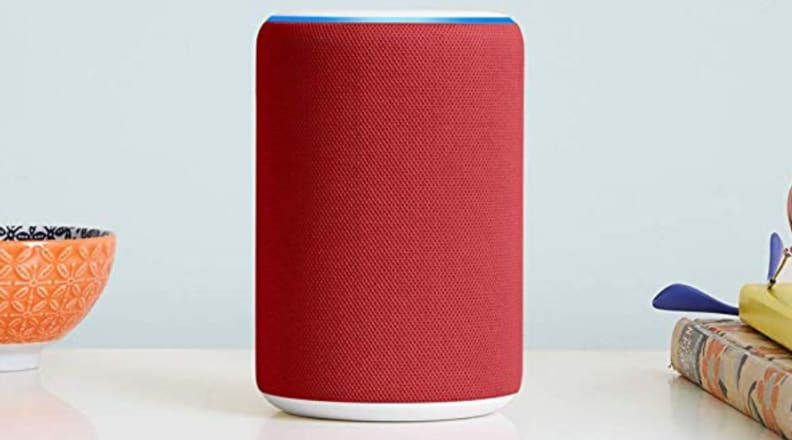
The Amazon Echo (third-generation) is sold in five colors including red.
When starting a conversation with your smart speaker, you typically get their attention by saying, “Hey, Google,” or, “Hey, Alexa,” followed by your question or command. This is known as the wake word.
With Alexa, you can use the Amazon Alexa app to change the wake word of your Echo speaker to something other than “Alexa.” In your speaker’s settings, you can set the wake word to Amazon, Echo, or Computer.
However, the wake word for Google Assistant can’t be adjusted. Currently, Google Home speakers only respond to “Hey, Google,” or “OK, Google,” but a subreddit thread also notes that “Hey Boo Boo” can be used to begin chatting with your Google Home speaker. While this command does work, it’s a little wordier to use than the usual, “Hey, Google.” We like that Alexa gives more options when it comes to wake words, giving it a leg up on Google Assistant.
Winner: Alexa
Which smart assistant is right for you?
Deciding between Alexa and Google Assistant can be a tricky choice. If you’re on the market for a new smart assistant, there are a few things to keep in mind before making a final decision.
While Google Assistant may offer more actions than Alexa does skills, Amazon’s smart assistant isn’t to be overlooked since it does work with more smart home devices than Google Assistant. However, both speakers are easy to use, work with many popular smart home devices, and offer many of the same basic skills and actions, like weather forecasts, reminders and timers, news, building grocery lists, and many other common commands.
One of the most obvious ways the two smart assistants differ is the types of media they can play. For example, if you opt for a smart display like Amazon’s Echo Show or Google’s Nest Hub Max, then you’ll be able to watch TV, movies, and other types of content directly on the device’s screen. However, you can’t stream Prime videos and movies on Google Home smart displays like you can on their Echo counterparts. Likewise, you won’t be able to watch live TV streaming services like YouTube TV on your Echo smart displays.
But it’s not just in visual streaming services where these two speakers differ—audio services vary, too. For example, if you enjoy listening to books using Audible, you should be aware that you won’t be able to play your favorite reads on a Google Home speaker since the company is owned by Amazon. The same goes for Amazon Music.
Neither speaker is necessarily “smarter” than the other when it comes to the types of content you can access. Rather, the scope of what Alexa and Google Assistant can do in terms of shows, books, and movies hinges more on what compatible apps and services you use most frequently.
Adding smart gadgets in your home can help make life easier. So, when buying smart home devices like the best smart locks or the best smart bulbs, consider which of those products are compatible with Alexa or Google—or both. And, if you’ve already got a smart home ecosystem set up in your house, it only makes sense to choose the Echo speaker or Google Home speaker that’s compatible with all of your gadgets.
The best Alexa and Google Assistant products
If you're looking to add Alexa to your home, we think the best Echo speaker you can buy is the Echo (third-generation). Thanks to it's Dolby audio, a 3-inch woofer, and a 0.8-inch tweeter, the sound quality of the Echo (third-generation) can really fill a room without taking up too much space. And, it's outfitted with far-field voice recognition so that Alexa can hear you when you call her name from a nearby room.
As for Google Home speakers, the Google Nest Hub Max is a great option if you're looking for a Google Assistant-enabled smart display screen. At $229, it's the most expensive Google Home speaker you can buy but it's totally worth the cost. thanks to its built-in Nest cam (which can be turned on or off), impressive sound quality, vibrant and responsive display, and sleek design.
